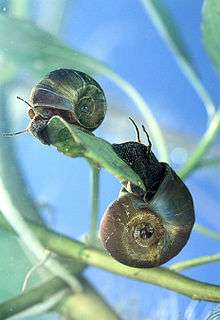Planorbella trivolvis
Planorbella trivolvis is a species of freshwater air-breathing snail, an aquatic pulmonate gastropod mollusk in the family Planorbidae, the ram's horn snails, or planorbids, which all have sinistral or left-coiling shells.
| Planorbella trivolvis | |
|---|---|
 | |
| Two specimen of Planorbella trivolvis in their natural environment, on aquatic vegetation | |
NE[1] | |
| Scientific classification | |
| Kingdom: | |
| Phylum: | |
| Class: | |
| (unranked): | |
| Superfamily: | |
| Family: | |
| Subfamily: | Bulininae |
| Genus: | |
| Species: | P. trivolvis |
| Binomial name | |
| Planorbella trivolvis (Say, 1817) | |
| Synonyms | |
Helisoma trivolvis | |
Description
All species within family Planorbidae have sinistral shells. The width of the shell of this species is up to 18 mm.
Distribution
This pond snail is native to North America, from the Arctic areas of Canada all the way south to Florida. It has also been introduced in other parts of the world.
Habitat
This species prefers habitats with floating water weeds.
Parasites
- Planorbella trivolvis is an intermediate host for Echinostoma trivolvis.[4]
gollark: Windows costs them a significant thing of that, I think.
gollark: Unlike yours.
gollark: My opinions are in fact objective fact.
gollark: A level computer science is only mostly worthless.
gollark: Yes.
References
- 2006 IUCN Red List of Threatened Species. <www.iucnredlist.org>. Cited 5 March 2007.
- Paraense W. L. (September 2003) "Planorbidae, Lymnaeidae and Physidae of Peru (Mollusca: Basommatophora)". Memórias do Instituto Oswaldo Cruz 98(6): 767-771. PDF
- Reeves W. K., Dillon Jr. R. T. & Dasch G. A. (2008). "Freshwater snails (Mollusca: Gastropoda) from the Commonwealth of Dominica with a discussion of their roles in the transmission of parasites". American Malacological Bulletin 24: 59-63. doi:10.4003/0740-2783-24.1.59. PDF Archived 2010-01-07 at the Wayback Machine.
- "Maintenance of the life cycle of Echinostoma trivolvis (Trematoda) in dexamethasone-treated ICR mice and laboratory-raised Helisoma trivolvis (Gastropoda)". doi:10.1007/s004360050200.
Further reading
- CYNTHIA G. NORTON & JENNIFER M. BRONSON (2006) "THE RELATIONSHIP OF BODY SIZE AND GROWTH TO EGG PRODUCTION IN THE HERMAPHRODITIC FRESHWATER SNAIL, HELISOMA TRIVOLVIS". Journal of Molluscan Studies 72(2): 143-147. doi:10.1093/mollus/eyi057
- Norton C. G., Johnson A. F. & Mueller R. L. (2008) "Relative size influences gender role in the freshwater hermaphroditic snail, Helisoma trivolvis". Behavioral Ecology 19(6): 1122-1127. doi:10.1093/beheco/arn099
- Johnson, P. D.; Bogan, A. E.; Brown, K. M.; Burkhead, N. M.; Cordeiro, J. R.; Garner, J. T.; Hartfield, P. D.; Lepitzki, D. A. W.; Mackie, G. L.; ; Tarpley, T. A.; Tiemann, J. S.; Whelan, N. V.; Strong, E. E. (2013). Conservation status of freshwater gastropods. of Canada and the United States. Fisheries. 38(6): 247-282
This article is issued from Wikipedia. The text is licensed under Creative Commons - Attribution - Sharealike. Additional terms may apply for the media files.